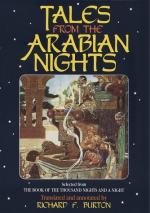[FN#62] In Al-Islam this was unjustifiable homicide, excused only because the Kafir had tried to slay his own son. He should have been summoned to become a tributary and then, on express refusal, he might legally have been put to death.
[FN#63] i.e. “Rose King,” like the Sikh name “Gulab Singh"=Rosewater Lion, sounding in translation almost too absurd to be true.
[FN#64] “Repentance acquits the penitent” is a favourite and noble saying popular in Al-Islam. It is first found in Seneca; and is probably as old as the dawn of literature.
[FN#65] Here an ejaculation of impatience.
[FN#66] i.e. “King Intelligence”: it has a ludicrous sound suggesting only “Dandanha-i-Khirad,,=wisdom-teeth. The Mac. Edit. persistently keeps “Ward Shah,” copyist error.
[FN#67] i.e. Fakhr Taj, who had been promised him in marriage. See Night dcxxxlii. supra, vol. vi.
[FN#68] The name does not appear till further on, after vague Eastern fashion which, here and elsewhere I have not had the heart to adopt. The same may be found in Ariosto, passim.
[FN#69] A town in Persian Irak, unhappily far from the “Salt sea.”
[FN#70] “Earthquake son of Ennosigaius” (the Earthquake-maker).
[FN#71] Arab. “Ruba’al-Kharab” or Ruba’al-Khali (empty quarter), the great central wilderness of Arabia covering some 50,000 square miles and still left white on our maps. (Pilgrimage, i 14.)
[FN#72] Pers. “Life King”, women also assume the title of Shah.
[FN#73] Arab. “Mujauhar”: the watery or wavy mark upon Eastern blades is called the “jauhar,” lit.=jewel. The peculiarity is also called water and grain, which gives rise to a host of double-entendres, puns, paronomasias and conceits more or less frigid.
[FN#74] Etymologically meaning tyrants or giants; and applied to great heathen conquerors like Nimrod and the mighty rulers of Syria, the Anakim, Giants and other peoples of Hebrew fable. The Akasirah are the Chosroes before noticed.
[FN#75] Arab. “Asker jarrar” lit. “drawing”: so in Egyptian slang “Nas jarrar"=folk who wish to draw your money out of your pocket, greedy cheats.
[FN#76] In Turkestan: the name means “Two lights.”
[FN#77] In Armenia, mentioned by Sadik Isfahani (Transl. p. 62).
[FN#78] This is the only ludicrous incident in the tale which justifies Von Hammer’s suspicion. Compare it with the combat between Rustam and his son Sohrab.
[FN#79] I cannot understand why Trebutien, iii., 457, writes this word Afba. He remarks that it is the “Oina and Riya” of Jami, elegantly translated by M. de Chezy in the Journal Asiatique, vol. 1, 144.
[FN#80] I have described this part of the Medinah Mosque in Pilgrimage ii., 62-69. The name derives from a saying of Mohammed (of which there are many variants), “Between my tomb and my pulpit is a garden of the Gardens of Paradise” (Burckhardt, Arabia, p. 337). The whole Southern portico (not only a part) now enjoys that honoured name and the tawdry decorations are intended to suggest a parterre.




